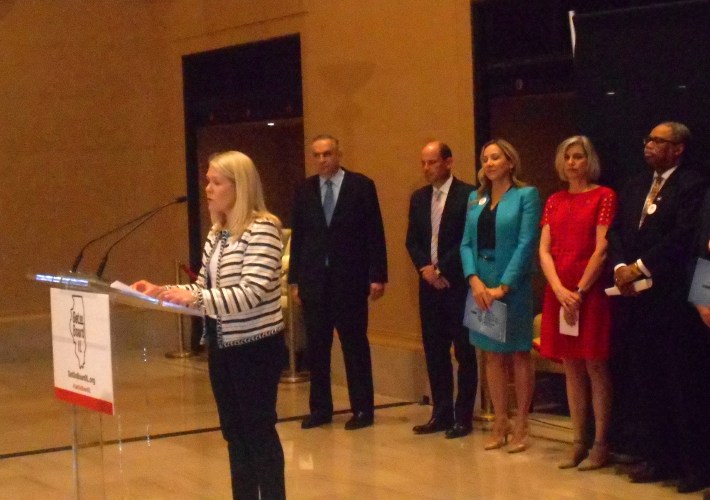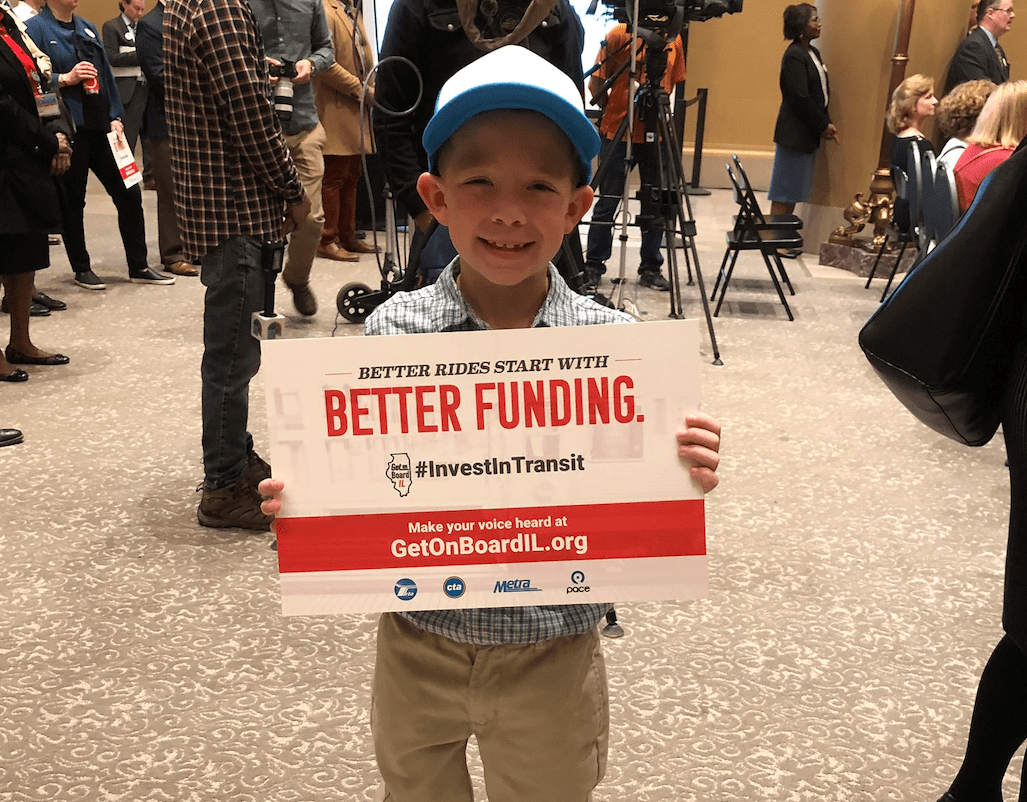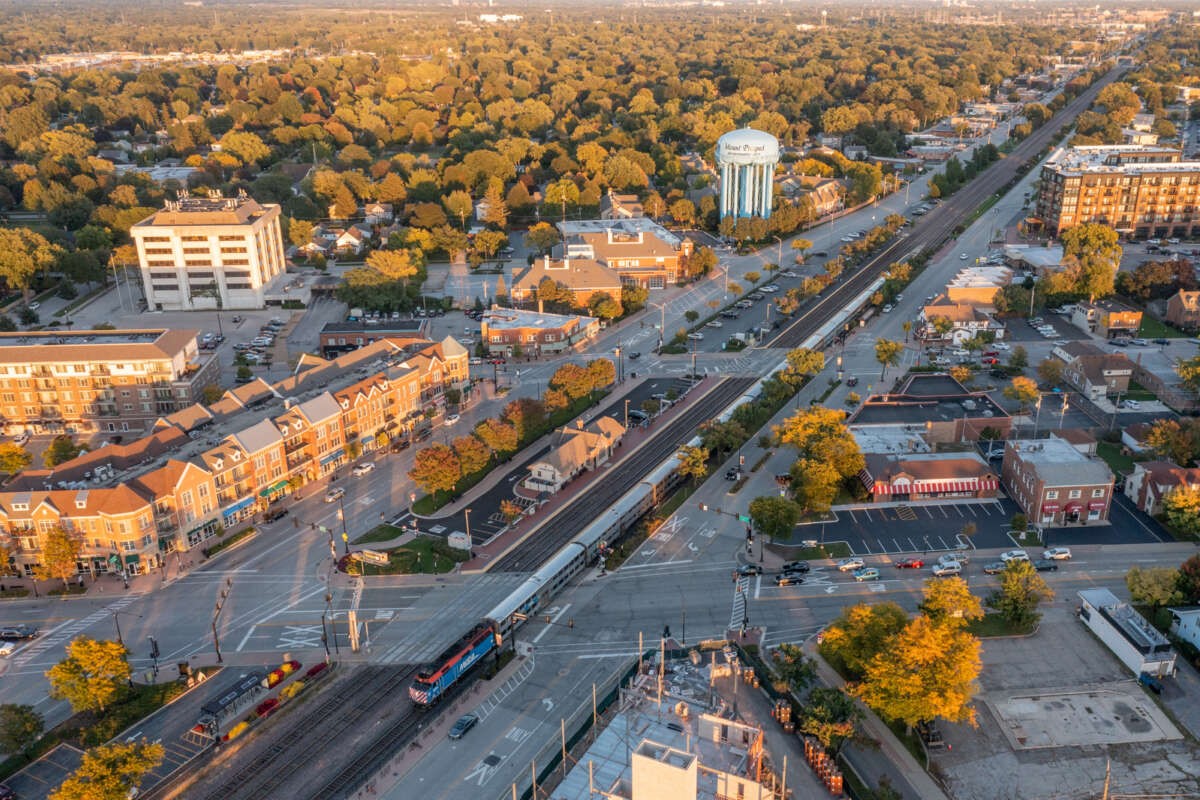As state legislators get ready to vote on the first budget under Governor J.B. Pritzker, Chicago-area transit officials and other local leaders gathered for a press conference at Union Station to urge the General Assembly to provide long-term, sustainable funding that would, at the very least, allow them to complete $37.7 billion in necessary capital projects.
This was just one of several events being held by transit agencies across Illinois this morning. During the press conference held at Union Station's Burlington Room, officials argued that the funding would ensure they can keep the regional transit system running more smoothly and make it more accessible to people with disabilities, which would ultimately benefit the state’s economy.
Last summer, the Regional Transit Authority, the CTA, Metra, and Pace released an extensive wish list of projects that they would like to do as soon as possible. About $19.4 billion of the funding would go to “state of good repair” projects. These include buying new vehicles to replace ones nearing the end of their useful life; fixing up infrastructure such as bus stops and rail embankments; and repairing and building new rail stations and bus terminals. But the transit systems are also looking to expand. CTA, for example, is asking for money to build the long-discussed Red Line extension, do track reconstitution on the Blue Line’s Forest Park branch to address slow zones. Pace wants to buy buses and expand garages so it can offer expanded service.
Pace spokesperson Maggie Daly Skogsbakken said that one major example of how financial constraints are holding back service is the bus-on-shoulder service along I-55 corridor. As I reported earlier this year, the transit agency recently reshuffled the service, eliminating low-performing Route 856 and shifting the freed-up buses to other routes. But even after this, Daily Skoggsbakken said, the buses are overcrowded.
“We don’t have the vehicles to support [increasing service],” she said. “We also don’t have the space to maintain and house them. The Heritage garage is bursting at the seams. We have to store [some] buses outside, which is not ideal.”
The agencies’ original proposal called for the state to contribute $2-3 billion a year – which would generate between $20 billion – $30 billion in funding over the next decade. During the press conference, RTA chair Kirk Dillard said that he knew that convincing the state to commit anything close to that would be a challenge -- but one that's worth taking on.
“As chairman of the RTA and a lifelong transit rider, I know firsthand the importance of transit to our region and state,” he said. “And a former state senator, I appreciate the multitude of issues facing our statewide elected officials. But, as today’s speakers show, public transportation affects us all, and its funding is critical to our regional and statewide economy.”
When asked where the funding would come from, Dillard said that this was something he would leave for state legislators to figure out. But he said that it had to be from a source that would be sustainable on the long run.
The new administration has shown some willingness to revive long-stalled transit projects. It recently released funding for two new city Metra stations: the Peterson Ridge station in Edgewater, and the Auburn Park station in Auburn-Gresham.
CTA president Dorval Carter argued that his agency doesn’t get nearly as much state subsidy per ride as peer systems in New York City and Boston. And while he described the CTA as a great system, he argued that it needs more investment to keep it running and make it even better. “Today, I urge everyone who cares about public transit to get on board and [urge the state] to finally pass the budget,” Carter said.
Karen Tamley serves as the Chicago’s Commissioner of the Mayor's Office for People with Disabilities and represents Chicago paratransit users on the Pace Board of Directors. She said that one of the major upsides of increasing capital investments would be to make the regional transit system more accessible to wheelchair users like herself, and other people with disabilities. While she said there has seen substantial progress since the Americans with Disabilities Act was passed in 1990, Chicago area transit still has plenty of room for improvement when it comes to accessibility.
“There are still 41 CTA stations that aren’t accessible,” Tamley said. “There are 44 Metra stations that aren’t accessible. There are a lot of passengers with disabilities that rely on public transit to get to work, to get to medical appointments.”
As she later told me, one of the issues with Metra stations is that they may be “partially accessible.” For example, all Metra Electric line stations have high-level platforms, so wheelchair users don’t need lifts to get on and off the train - but many of those platforms don’t have elevators or ramps to get down to street level.
“We can become the first legacy rail system [in United States] to be fully accessible,” Tamley said during the conference.
Business leaders at the presser voiced support for investing in transit. Matt Goebel, spokesman for North Chicago-based AbbVie Inc biopharmaceutical company, praised the recently launched Metra reverse commute service pilot.
“Our employees commute everyday from Chicago and Wisconsin,” he said. “The new express trains had a significant impact on travel times, making their commute manageable and less stressful. That is why we’re here today to show support for long-term consistent funding.”

RTA Executive Director Leanne Redden framed the capital funding as an investment in the state’s future. “People and businesses around the state count on public transit, and it contributes mightily to our economy,” she said.
The Northern Indiana Commuter Transportation District, which operates the South Shore Line, finds itself in an interesting position. The South Shore primarily serves four counties in northwestern corner of Indiana, but it also provides the only rail service to Chicago’s Hegewisch neighborhood, and it stops at Hyde Park and downtown Chicago. The agency receives RTA funding to support the Chicago portion of the service.
Redden told me that NICTD has been supportive of the RTA’s push, and she noted that, in contrast to Illinois, Indiana has been investing in transit. The Indiana General Assembly recently approved $200 million in funding to help secure secure matching federal funds for two major South Shore Line capital projects - building the brand-new West Lake branch to serve cities south of Hammond and double-tracking the currently largely single-track segments between Gary and Michigan City.
“I want to point out that Indiana raised revenue to invest in transit,” Redden said. “And we [at the RTA] worry that Illinois is going to be left behind.”
The RTA press release noted that Chicago area transit agencies are hardly alone in their capital needs. Other Illinois transit agencies “have more than $1.5 billion in reinvestment needs.”
Mayor Stephanie Acri of Moline was at the press conference to support the RTA and to bring attention to the capital needs in her own region. Moline is one of the eight Illinois municipalities in the Quad Cities region served by the MetroLINK bus transit system. She told me that she personally appreciates the bus system’s impact.
“MetroLink is a wonderful services,” she said. “I run a repair shop and my employees use the system every day. [But] it is in need of investment, to [allow it] to continue to operate and the level we need them to operate at.” Acri added that she would welcome the long-stalled Amtrak project to connect Chicago to Quad Cities, which would bring economic investment to the region. “That’s what’s most important to us.”



